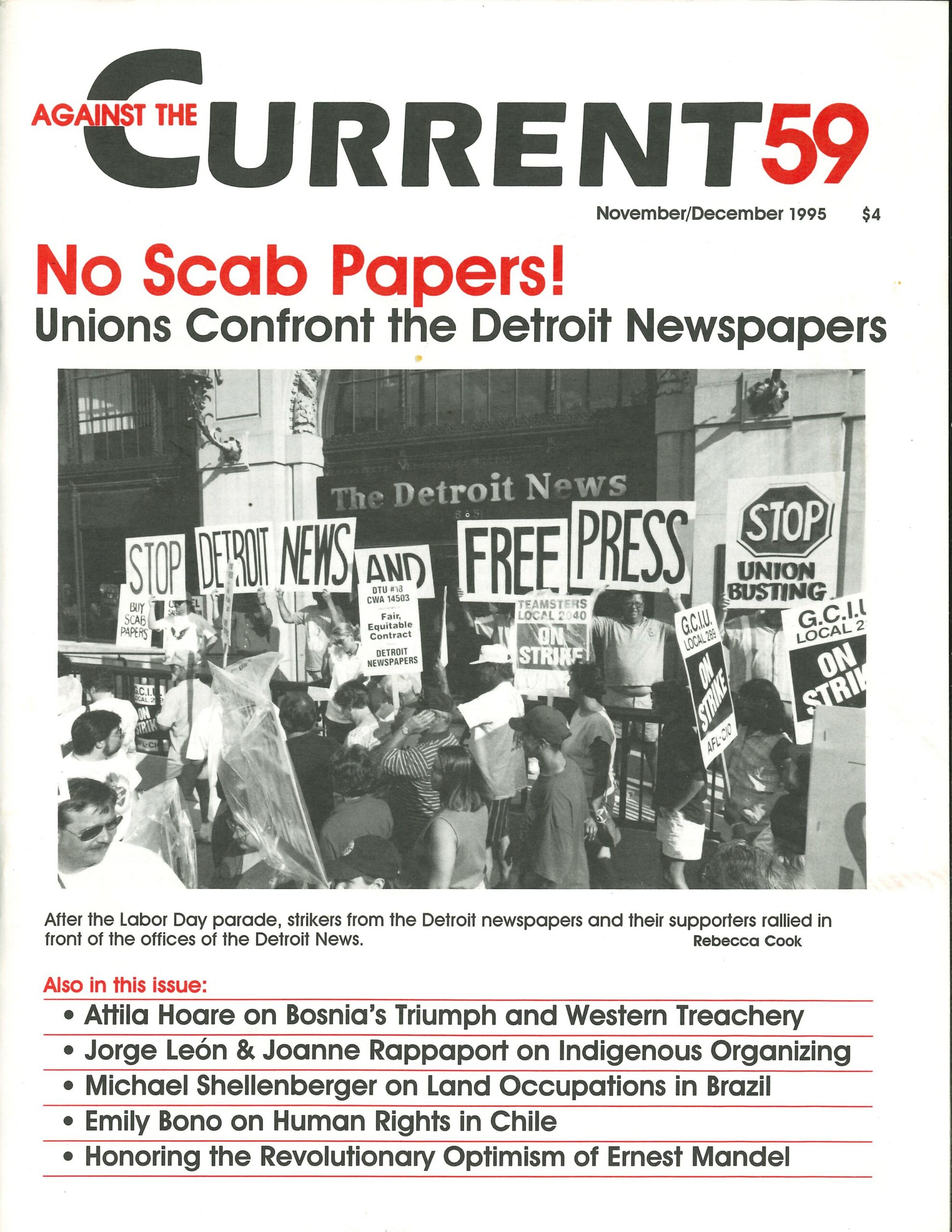Against the Current, No. 59, November/December 1995
-
Labor Wars, from Top to Bottom
— The Editors -
The Detroit Newspaper Labor War
— David Finkel -
Potrait of a Strikebreaker
— Roger Horowitz -
Bosnia's Triumph and Western Treachery
— Attila Hoare -
Radical Rhythms: World Music--What in the World Is It?
— Kim Hunter -
Letter to the Editor--and Reply
— Michael Funke; Archie Lieberman -
The Rebel Girl: The Complexities of Inclusion
— Catherine Sameh -
Random Shots: Bad Cop! No Donut!
— R.F. Kampfer - A Symposium on Imperialism Today
-
Introduction
— The Editors -
The Shape of Today's Imperialism
— Kim Moody -
Myths of "Humanitarian" Intervention
— Michael Parenti -
Imperialism with a Human Face?
— Paul Le Blanc - Organizing in the Americas
-
Haiti: The Elections and After
— Dianne Feeley -
Chile: The Human Rights Challenge
— Emily Bono -
Land Occupation and Struggle in Brazil
— Michael Shellenberger -
Amazon Peasant Massacred
— Michael Shellenberger -
Forced Labor in Brazil: An interview with James Cavallaro
— Marcelo Irajá de Araújo Hoffman -
Indigenous Organizing in Colombia and Ecuador
— Jorge León and Joanne Rappaport - Reviews
-
Uncracking Crack Coverage
— Janice Peck - In Memoriam
-
Ernest Mandel: A Passionate Optimistic Marxist
— Anwar Shaikh -
Ernest Mandel: Internationalist and Dear Comrade
— Rosario Ibarra de Piedra -
In Tribute to Ernest Mandel
— Andre Gunder Frank -
Ernest Mandel: Revolutionary of the 20th Century
— Manuel Aguilar Mora -
Ernest Mandel: A Revolutionary Heroic Life
— Jacob Moneta -
Hedda Garza, 1929-1995
— Patrick M. Quinn -
William Kunstler, 1919-1995
— Michael Steven Smith
Catherine Sameh
THE OUTCOME OF the O.J. Simpson trial has generated a national discussion of immense importance and complexity about divisions across race, class and gender–about dilemmas and compromises.
It’s a discussion worth having, despite the sensationalist climate in which it’s occurring. The strange conversion of Norma McCorvey, better known as Jane Roe, raises similar albeit less charged questions.
In August McCorvey “came out” as a convert to fundamentalist Christianity and the pro-life movement (though still, she says, in favor of the right to first-trimester abortion). McCorvey claims she became disillusioned by the seemingly insensitive attitude of her abortion clinic co-workers.
Her crisis of faith was not lost on an Operation Rescue member she spoke with daily (the OR office is stationed next to the clinic where McCorvey worked), who eventually won her over. Stranger perhaps than her about-face into the arms of anti-choicers is the fact that McCorvey is an out lesbian.
In the November issue of Out magazine, quippy author and columnist Michelangelo Signorile asks, “Is there room in the lesbian and gay movement for antichoice queers?” My answer, quite frankly, is a whispered “I don’t know.”
The best of left activists (I’ll include myself here) have always embraced the contradictory nature of humanity, seeing the glass as always half-empty half-full. We try gently but unapologetically to expose these contradictions by building real alliances across differences.
Our best hope is to change hearts and minds, ours included, in the spirit of trust and solidarity. We don’t settle for agreeing to disagree, which is the next best thing and not so bad in itself.
But I gotta say, a pro-life dyke is hard to stomach. As hard as a log-cabin clubber. It’s not that queers of every stripe don’t share fundamentally important. In the heady sea of bodies at queer pride celebrations every summer, we do stand as one unified “fuck you” to the straight world that would deny us our hearts’ callings. And no queer–rich, poor, male, female or other, left or right–is safe from some kind of homophobia.
But as Signorile points out, “lesbians and gay men as a movement have so closely linked abortion rights and gay rights.” For women, the link is our right to control over our bodies, to choices about whom to sleep with and whether or not to bear children. It’s about the separation of sex and reproduction.
That link also extends to the fight against race and class oppression, because each struggle challenges a social order that seeks the control of the world’s wealth and privileges by an elite few–at the expense of every oppressed group that gets cycled through as the newest scapegoat.
I would never argue for exclusion of pro-life queers from the lesbian, gay, bisexual and transgendered movement. But I would argue for radical queers not to sidestep the awkwardness such inclusion creates.
This is one contradiction we must expose, and the hard questions must be raised about what the queer challenge, after all, is about.
November/December 1995

